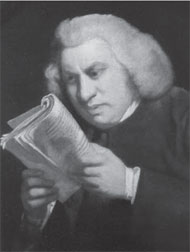Treat Dictionary as a vade mecum
 As sheer casual reading matter, I still find
the English dictionary the most interesting book in our language. As sheer casual reading matter, I still find
the English dictionary the most interesting book in our language.
- Albert Jay Nock
Once Mark Twain, the author of The adventures of Tom Sawyer, sat in
the United States Senate listening to a friend making a long speech.
Mark Twain thought he should have some fun with his friend.
"Do you know, Senator, I was surprised at your speech. You may not
believe it, but I own a very old book which has every word of that
speech in it!"
The Senator was indignant. "That speech", he shouted, "was entirely
my own! I'd like to see the book that contains my speech!"
After a few days the Senator received a copy of a dog-eared
dictionary which contained every word he had used!
A good dictionary may have all the words you use in writing or
speaking. However, most of us take the dictionary for granted as a
necessary part of our life. Although the Dictionary is a sine qua non,
the English language was in use a long time before the words in it were
put into the first dictionary. The word "Dictionary" itself came into
being only in 1526, less than 40 years before William Shakespeare was
born.
Lexicographer
It is impossible to talk about the dictionary without reference to
Samuel Johnson (1709 - 1784) who was a celebrated writer and
lexicographer. He is one of the notable lexicographers who started to
compile a dictionary of the English. He regarded English spelling, or
orthography, as "unsettled and fortuitous." Samuel Johnson felt it was
his duty to change it. The dictionary he compiled was published in 1755.
It consisted of words from many languages such as French, Latin, Greek,
Saxon, German and Hebrew. Even modern dictionaries give such etymologies
as a matter of course.
 |
|
Samuel Johnson dubbed
'Dictionary Johnson' |
As there were no other dictionaries around, his well-wishers hoped
that Samuel Johnson's dictionary of English language would "fix the
language" permanently. However, he saw very clearly that language would
inevitably change in the course of time. In fact, he said, "to enchain
syllables is to lash the wind... some words are budding and some falling
away." It is amazing that even in the 18th century Samuel Johnson
foresaw what would happen to the language.
Samuel Johnson's Dictionary is one of the first few attempts at
compiling the English words and their meanings. Between 1800 and 1900
new insights of scholars led to the creation of the science of
historical linguistics. The 19th century scholars introduced a new
approach to language, based on the inductive analysis of information. As
a result, scholars from the United States,England and other European
countries got together and compiled the greatest dictionary ever
produced. The Oxford English Dictionary, running into 12 volumes,
records more than half a million words with their etymologies, phonetic
representations, definitions and quotations.
Stiff competition
While Johnson's dictionary contained about 40,000 entries elucidated
by vivid, idiosyncratic and still-quoted definitions, modern
dictionaries offer the reader much more. In fact, while the Oxford
English Dictionary (OED) is leading the way, it is facing stiff
competition from others such as the Cambridge English Dictionary,
Chamber's English Dictionary and Collins English Dictionary. The OED has
put out a reader-friendly Oxford Advanced Learner's English Dictionary.
Not to be outdone, today we have access to the Cambridge Advanced
Learner's English Dictionary as well. Collins too updates its series of
dictionaries using colour headwords and clear print. The recently
published Chamber's English Dictionary and the Thesaurus is a treat to
English learners.
Lord Macaulay once remarked that he would take a copy of the OED if
he were to spend a holiday in an island! Much water has flowed under the
bridge since then. Today even if you gift a copy of the OED as a
birthday present, the recipient will not care to use it. The younger
generation may not know the value of a dictionary. Therefore, parents
and teachers have a duty to tell their children and students that nobody
can learn English well without using a dictionary.
As the English language is expanding every day, we cannot afford to
use the same old dictionary for ever. As one writer put it, if your
dictionary is more than 10 years old, put it in the attic! What he said
is true. We have to buy the latest dictionary if we really care for the
language. For instance, old dictionaries do not have the meaning of
computer terms which are very much in vogue.
Buying a dictionary and using it at least for a few years is a wise
investment. If you are a serious student of English, you cannot be
satisfied with a copy of the OED. You need to have access to other
dictionaries - Cambridge, Collins, Chambers - as well. All the words are
not found in one dictionary. So, we must be ready to consult other
dictionaries when the need arises. If you have access to a
dictionary-cum- thesaurus, it will obviate the necessity to refer to a
separate thesaurus.
Treat the dictionary as a vade mecum. Take it wherever you go.
Consult it whenever you want. Make it a habit to browse through it. The
gems you find in it are invaluable.
|

